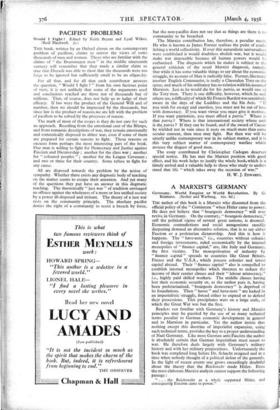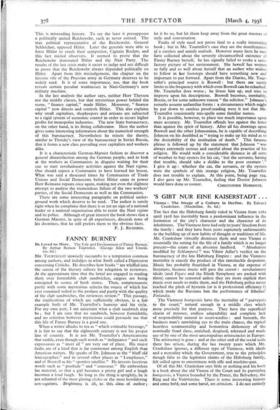A MARXIST'S GERMANY
Germany. World Empire or World Revolution. By G. Reiman. (Seeker and Warburg. los. 6d.) , THE author of this book is a Marxist who dissented from the official policy of the " Comintern " when Hitler came to power. He does not believe that " bourgeois democracy " will ever revive in Germany. On the contrary, " bourgeois democracy," still the political regime of several great nations; is doomed. Economic contradictions and social antagonisms steadily deepening demand an alternative solution, that is to say either Fascism or a proletarian dictatorship. And this is how it happens. The " have-nots," i.e., countries without colonies and foreign investments, ruled economically by the internal monopolies of " finance capital," are, like Italy and Germany, the first victims. The monopolisation of industry by " finance capital " spreads to countries like Great Britain, France and the U.S.A., which possess colonies and invest capital abroad. Their " finance capital " also is compelled to establish internal monopolies which threaten to reduce the income of their rentier classes and their " labour aristocracy," i.e., highly paid skilled workers. The middle classes having lost their economic security or, as the author puts it, having been proletarianised, "bourgeois democracy" is deprived of its foundations. Then " haves " and have-nots " are locked in an imperialistic struggle, forced either to expand or to defend their possessions. This precipitates wars on a large scale, of which the Great War was but the first.
Readers not familiar with Germany's history and Marxist principles may be puzzled by the use of so many technical terms peculiar to German economic development in general and to Marxism in particular. Yet the author insists that nothing except this doctrine of imperialist expansion, using such technical terms, provides the key to a proper understanding of Nazi Germany. Like most German anti-Fascists the author is absolutely certain that German imperialism must resort to war. He therefore deals largely with Germany's military history and with her military preparations. Unfortunately the book was completed long before Dr. Schacht resigned and at a time when nobody thought of a political defeat of the generals. In the light of recent events one grows exceedingly doubtful about the theory that the Reichswehr made Hitler. Even the most elaborate Marxist analysis cannot 'support the following passage : . the Reichswehr as a whole supported Hider, and
consequently Fascism came to power." .
This is misreading history. To say the least it presupposes a politically united Reichswehr, such as never existed. The true political representative of the Reichswehr, General Schleicher, opposed Hitler. Later the generals were able to force Hitler to crush their competitor, captain 4oem, and this fact misled observers. It seemed io prove that the Reichswehr dominated Hitler and the Nazi Party. The results of the last crisis make it easier to judge and not difficult to prove that the Reichswehr always depended politically y Hitler. Apart from this misjudgement, the chapter on the historic role of the Prussian army in Germany -deserves to be widely read. It is of some importance,* tool that the book reveals certain peculiar weaknesses in Nazi-Germany's new military machine.
In the last analysis the author says, neither Herr Thyssen nor the middle classes, but that mysterious power behind the scene, " finance capital," made Hitler. Moreover, " finance capital " now directs and controls Hitler. This also explains why small capitalists, shopkeepers and artisans are subjected to a rigid system° of economic control in order to secure higher profits for monopolist industries. The new State bureaucracy, on the other hand, is its fitting collaborator. Here the author giVes some interesting information about the numerical strength of this bureaucracy. Nevertheless he rejects the theory, similar to Trotsky's view of the bureaucracy in Soviet Russia, that it forms a new class prevailing over capitalists and workers alike.
It is a characteristic German-Marxist fashion to discover a general dissatisfaction among the German people, and to look at the workers as Communists in disguise waiting for their cue to start revolutionary activities against the Nazi regime. One should expect a Communist to have learned his lesson. What was said a thousand times by Communists of Trade Unions and Social Democrats before Hitler came to power Herr Reimann repeats once again, making not even the slightest attempt to analyse the tremendous failure of the two workers' parties, of the Social Democrats as well as the Communists.
There are some interesting paragraphs on political under- ground work which deserve to be read. . The author is surely right when he complains that there is as yet no sign of a national leader or a national organisation able to resist the Nazi regime and its police. Although of great interest the book shows that a German Marxist, in spite of all experiences, discards none of his doctrines, that he still prefers them to the obvious facts.
F. J. RICHARDS.







































































 Previous page
Previous page